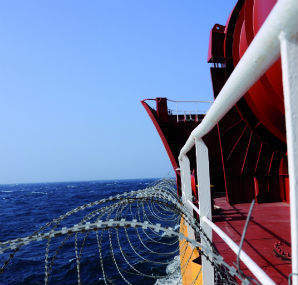The oil and gas industry has never been so aware of the need to protect its personnel and assets. Paul Everitt, chief executive of security trade organisation ADS, tells Mark Brierley how the security industry can help.

The issue of security has gradually been creeping up the agenda of the oil and gas industry over the past few years, as established and newly emerging threats have come to the fore. With piracy, originating from Somalia and the Horn of Africa, spreading to the Gulf of Guinea and the South China Sea, oil and gas vessels are just as much at risk as other commercial shipping vessels operating in these areas.
Add to this the threat against the industry’s fixed assets, such as the recent hostage situation at a BP-run facility in Algeria in which more than 30 workers were killed, it is clear that the geographical spread of any industry that must go wherever there are reserves, no matter how inhospitable the environment, makes security an extraordinary challenge.
"The location of physical assets can make security a bigger challenge," agrees Paul Everitt, chief executive of ADS, the trade organisation representing the UK’s security industry. "Ultimately, attacks are conducted against the weakest link, which is often found in remote locations."
But even within the relative safety of an oil company’s own borders, security cannot always be assured, with cyberattacks and organised crime a threat regardless of location. "We are seeing an increase in the number of sophisticated cyber-attacks against the industrial control systems that manage the UK’s critical infrastructures," adds Everitt.
"With this intangible but very real threat, the priority must be in raising awareness and changing culture and behaviour to better manage this 21st-century business risk."
A long and growing list of potential security challenges such as this make protecting the personnel and assets of the industry an unenviable task, but it is one Everitt believes the UK security industry is well placed to tackle. "The UK is world-leading when it comes to security technology, consultancy, training and guarding," he explains, "and in dealing with terrorism and serious and organised crime – particularly in complex environments."
Indeed, the UK security industry achieved sales of £1.8 billion in 2011 and invested £77.4 million in research and development last year, in an effort to keep one step ahead of ever-escalating threats. UK Trade & Investment expects this trend to continue, with growth estimated at 9% per annum between now and 2020.
A joint effort
While the success of the security industry offers some comfort, the specific needs of the oil and gas industry may not always be met – something Everitt recognises must change. "Work to improve collaboration between ADS and the oil and gas industry is underway to raise awareness, understand specific threats and jointly mitigate these threats. An ADS special interest group – the Major Security Events Group – is leading on
this initiative. The UK Government is also becoming increasingly active in developing strategies and capabilities to protect the UK’s critical national infrastructure, of which the energy sector is an important part."
In the case of maritime security from the threat of piracy, this is something already being met thanks to the work of organisations such as SAMI and ADS. Private security has been widely accepted as the best means of tackling piracy, rather than relying on naval forces to patrol vast swathes of the Indian Ocean and other newly emerging piracy hot spots, such as the South China Sea.
Piracy has been falling around the Horn of Africa since the widespread introduction of private security forces onboard ships in the region in the past
few years. In the Somali Basin, piracy has fallen from a high in 2010 of 69 ships being attacked, and 88 being disrupted by pirates, to a low of just eight attacks and 19 disruptions last year. While these trends are encouraging and prove the good work being done by private security, these ‘guns for hire’ have been also been accused of using unnecessary force. The aim of ADS is to raise standards among private security
providers, in an effort to shake off this tag of heavy handedness.
"Maritime security companies that join the Security in Complex Environments Group (SCEG), a special interest group within ADS, are required to become signatories of the International Code of Conduct for Private Security Service Providers, which puts human rights concerns at the heart of their business models," explains Paul Gibson, director of SCEG. "This ensures that individuals are properly and appropriately trained, vetted and briefed before conducting their duties. The deployment of armed guards on UK-registered ships is a rigorous process involving three government departments, vetting by the Disclosure and Barring Service, and the review of an individual’s suitability by a minister in the Home Office."
These efforts should pay dividends in quashing the nascent upswing in piracy in the Gulf of Guinea and South China Sea, before it has a chance to gain momentum as it did around the Horn of Africa over the last decade, before being brought under control over the past 12 months. However,
success in the fight against seaborne piracy is only one of many security challenges facing the industry; the protection of onshore fixed assets in
inhospitable and sometimes politically unstable regions, plus cybersecurity are just two other challenges that will remain for the foreseeable future.
Everitt is confident, though, that the continued efforts between the oil and gas and security industries will keep them one step ahead of their adversaries. "While it is likely that the oil and gas sector will continue to come under threat from both terrorism and organised crime, and
cybercrime is likely to increase, the UK security industry has the capabilities and technologies to deal with these escalatingthreats," he says. The important short term objective is to ensure collaboration with governments or privately owned oil and gas companies in order to assess the
increasing threats and develop the appropriate security strategies."
